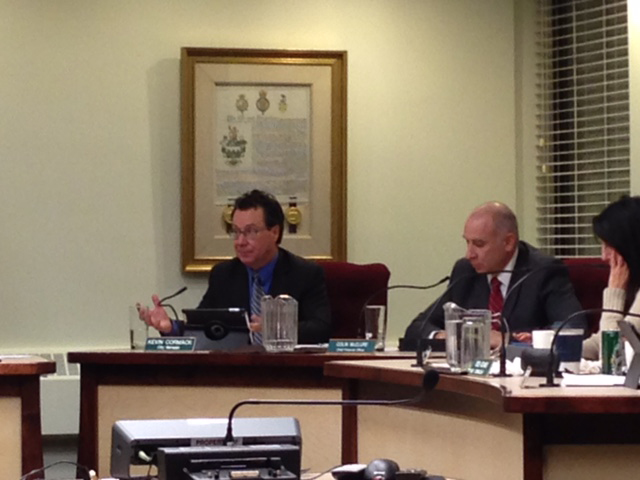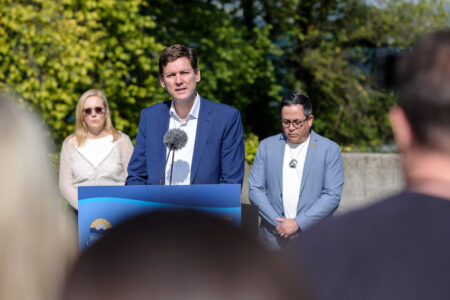City turns off tap (almost) on water and sewer rate increases for 2016
The torrent that once was annual water and sewer rate increases in the city will slow to a trickle this year with only an “inflationary” rate increase planned.
City taxpayers will only endure a three per cent increase in water rates and a two per cent increase in sewer rates, down from double to triple those figures in previous years.
The amount of increase is far less than what was recommended in Sewer and Water Master Plans, said Mayor Deb Kozak, because for nearly a decade the city has saved money on water and sewer line replacement by creating an in-house work crew.
When the master plans were created 10 years ago was decided to revisit them in 2016, said city chief financial officer Colin McClure. And the short-term pain has turned into long-term gain as the work has moved ahead on replacement of the aging infrastructure, he said.
“In some cases it harkens back to the mayor and the first council that had to make the tough decisions to increase the rates to get this water done,” said McClure, adding that the current council only has to institute an inflationary increase now that the up front work is done.
The city will also continue the strategic ICI/residential metering installation and data collection project, and analyze the data collected for the 2015-2016 period.
However, the implementation of phase two of the meter rate increase — approved in 2013 that would see the metered rate double (with the increase phased in over three years) — will be put on hold until further meter data information has been collected.
The meter rate is to only be increased by the normal increases to the other water and sewer rates, said McClure. Implementation of the 33 per cent meter rate increase is scheduled for 2018 and 2019.
With these increases, rates for a single family dwelling will increase by $15.30 for water, $9 for sewer, for a $24.30 total (or $2.03 per month).
The cost could be less since water usage, even after a hot and dry season, has been dropping, said city manager Kevin Cormack. Water usage in Nelson was the lowest since before 2008, he said.
“Even with the growth we’ve had in our community, our water usage is way down,” he said.
He credited a combination of investment in the water system and a reduction of leaky pipes, with the community stepping up to reduce usage as contributing factors in the drop. The infrastructure replacement project, he explained, put Nelson in the top 10 per cent bracket in the country for such an endeavour.
“From the beginning council said ‘We have to get our house in order to make sure we don’t have millions of gallons leaking out of our pipes,’” Cormack said.
But the proposed rate increases will ensure that the water and sewer utilities are still sustainable and will allow the city to keep on target with implementing the capital upgrades as outlined in the Water and Sewer Master Plans, while maintaining an appropriate balance in the respective utility reserve accounts.
Under the capital plan, the city has been averaging 1.8 kilometres in annual water line replacement — with two km. suggested for the first 10 years (2006 to 2016).
The estimated waterline replacement cost per metre was originally $1,000. Actual city waterline average per metre cost decreased to $525 in 2009 and has continued at this rate, being a direct result of the city creating a capital crew to do the work rather than contracting all the replacement work.
“The city has over 80 kilometers of water mains, therefore the savings are in the tens of millions of dollars if the city can continue replacing at this cost,” said McClure in his report to council.
The city has also been averaging 2.5 km. in annual sewer line replacement , with 1.3 km. suggested for the first five years (2011 to 2016).
“This is due to favorable pricing received through the CIPP program which has allowed for a greater amount of repair work to occur at a better price than conventional excavation,” said McClure.
The estimated sewer replacement cost per metre was $525 — the actual city cost has been averaging $206 since 2010, which is also a result of the favorable pricing received through the CIPP program, he added.
The city has over 80 km. of sewer mains, therefore the savings are in the tens of millions of dollars if the city can continue replacing at this cost, McClure noted.
Sewer sense
- Around 68 per cent of the metal sewer piping has been replaced or relined, which were the worst mains in the system.
- Both of the recommended secondary lift stations (CPR and KFP) replacements are scheduled for upgrading in 2018 and 2020, respectively.
- Phase 1 Hall Street sewer upgrades were completed. Phase 2 is to commence in 2017 depending on grant funding.
The rates charged for water and sewer must pay for operating and capital costs, as well as build adequate reserves to fund future capital expenditures.

























